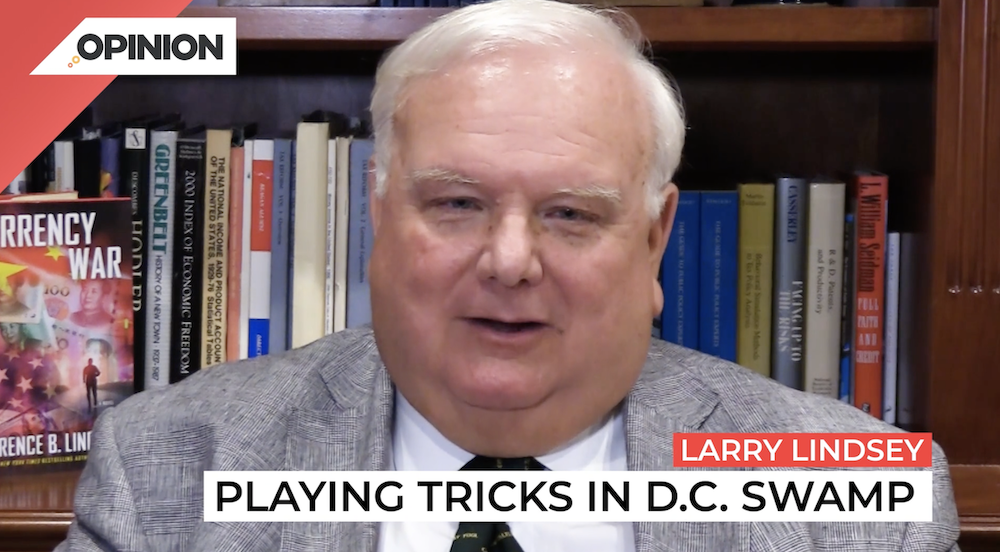
Commentary
-
Our commentary partners will help you reach your own conclusions on complex topics.
Greetings from the swamp. I mean, our nation’s Capitol. Well, we have a tale that explains why the founding fathers who wrote the constitution did what they did.
Now, what they realized was that people who go into politics tend to be ambitious. They saw that in the Kings’ service servants who managed America and sort of cut the king out of a lot of decisions. We also saw it among themselves, the founding fathers were generally an ambitious bunch. The most famous of, in terms of ambition was probably Alexander Hamilton, something you can see in the show Hamilton. But you can also see that the constitution there’s a provision that says you have to be a native born or natural born citizen of the United States. And that was targeted toward exactly one person, Alexander Hamilton. They thought he was the type they really didn’t want to be president.
Well, these instincts of the founding fathers came into full display when chaos broke out in the Congress over the passage of the budget. And as you know, nothing much got passed despite the fact that the same party runs the White House, the House and the Senate.
Well, here’s the backstory: Back on July 28th, Chuck Schumer, who’s the Senate Majority Leader, democratic leader, needed a vote from Joe Manchin, who’s a Senator from West Virginia and a fiscal conservative. How did he get his vote? Well, he promised Manchin just about everything he wanted.
While Schumer, Pelosi, and the President were all talking about a $3.5 trillion dollar bill, Manchin put an absolute limit on what he would support at $1.5 trillion.
What did Schumer do? He signed a letter promising Manchin that that’s what he would get. And then he kept the letter secret.
He didn’t tell his colleague, Speaker Pelosi. He didn’t tell his colleague, President Biden. So those two went on as if $3.5 trillion was going to be the number despite the fact that he had promised Manchin it would only be $1.5 trillion.
Well, all of this broke and it really just threw everything into chaos because they never shared it.
Now, my hunch is that Schumer thought that in the end he could twist Manchin’s arm into doing the right thing.
Manchin figured that out when the letter came out, that must have been Schumer’s intent. And that, of course, made Manchin mad. So what does he do?
He adds more conditions, conditions that had nothing to do with money. They had to do with something called the Hyde amendment, which bans federal funding abortions. Of course, that was a key goal of the House and Senate Democrats. So he’s really punishing them, making them pay for having been tricked by Schumer.
And then Speaker Pelosi had a problem. She had promised her moderates that they would have a vote on the bi-partisan infrastructure project no later than Monday the 27th.
Well, the progressives in her caucus were insisting that there would not be a vote on that, or they would vote against it until they had support for their big $3.5 trillion dollar package.
But here Schumer had promised Manchin there would never be a $3.5 trillion package.
So they ended up blocking the vote. So what did speaker Pelosi do?
Well, first she delayed the September 27th vote to Thursday, the 30th. Nothing happened on this Thursday, the 30th. So they pulled an old Washington trick called stopping the clock. So Thursday, the 30th bled into Friday, October one, bled into the night of Friday, October one. And finally they decided they couldn’t stop the clock anymore.
So on October 2nd, they restarted it on October 2nd. So somehow in the House of Representatives, October one simply disappeared. That was the only trick Nancy could pull, excuse me. Speaker Pelosi could pull in order to get through the week.
Then she ended up saying, well, we can’t have the vote now that I promised for September 27th until later in the month, specifically October 31st.
Meanwhile, Schumer can’t get the bill through the Senate.
Manchin is blocking that, requiring other conditions.
The President got involved. He sort of threw another number in the mix and that number isn’t going to work.
So the next step in all of these goings-on is going to be that vote that Pelosi promised on October 31st, more than a month from what she had originally promised. That’s a hard deadline. Well, listeners, we know what October 31st is: trick or treat.
-
Election 2024 will boil down to the Great Lakes states
Pollsters and pundits have been engaged in a long debate about how Biden or Trump might win the 2024 election, with much of their focus spent on the “swing state” electoral battlegrounds. While the winners of Alabama or California may be obvious, for instance, who wins Pennsylvania is a more difficult question. Watch the above…
-
Why the Fed should consider Theory of Reflexivity when fixing policy
The Theory of Reflexivity, often used in the context of economics and financial markets, implies that investors don’t base their decisions on reality but on their perceptions of reality. This creates a feedback loop where investors’ perceptions influence economic fundamentals, which in turn alter investor perceptions. Watch the above video as Straight Arrow News contributor…
-
Federal Reserve surpassed its own wildest expectations
On May 14, the U.S. Bureau of Labor Statistics released the most current producer price index (PPI) report, which showed an increase of 0.5% month-over-month in April. After the report’s release, U.S. Federal Reserve chairman Jerome “Jay” Powell said that while he believes the current policy rate is restrictive by many measures, the Fed needs…
-
Polls give slight advantage to Trump in Electoral College
With the U.S. general election only six months away, leading candidates President Joe Biden and former President Donald Trump appear to be engaged in a very close contest. In their 2020 race, the winner of the Electoral College was ultimately determined by a relative handful of voters in just a few swing states, even though…
-
College sports is big money but not everyone benefits
March Madness has wrapped up and Caitlin Clark has emerged as a household name as well as a wealthy student athlete. Earning over $3 million throughout her college career, her success stands in stark contrast to the previous notion that collegiate athletes shouldn’t earn anything beyond their scholarship. Straight Arrow News contributor Larry Lindsey examines…
Latest Opinions
-
 U.S. Department of Defense
U.S. Department of Defense
Congress still trying to figure out how to reduce wasteful military spending
-
 DVIDS
DVIDS
US Navy, Air Force making waves with new weapons at RIMPAC
-
 Getty Images
Getty Images
Israeli PM Netanyahu meets with Trump at Mar-a-Lago
-
 Getty Images
Getty Images
Growing US nuclear power resurgence reaches the nation’s heartland
-
 Getty Images
Getty Images
Beer from the sun, other solar thermal projects get government funding
Popular Opinions
-
In addition to the facts, we believe it’s vital to hear perspectives from all sides of the political spectrum.


